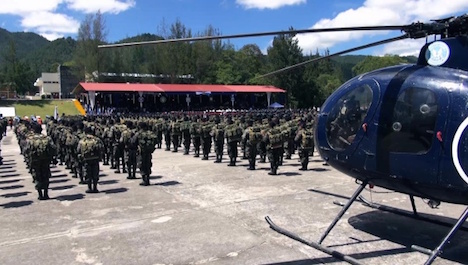Honduran militarization breaks peace agreements
 Print This Print This
By Staff Writers, teleSUR
teleSUR
Friday, Dec 26, 2014
 |
| Militarization in Honduras will be deepened in 2015 | Photo: teleSUR |
From January 2015, Honduras will have an active military general as security minister, breaking the historical regional peace agreement that security and intelligence would always be carried out by civil authorities in order to avoid the abuses of the military dictatorships of the past.
In August 1897, Central American countries signed an agreement called Esquipulas 2. It was the beginning of the peaceful resolution of several armed conflicts in the region. One of the main aims was to prevent the return of military dictatorships, by separating defense and security responsibilities and powers.
The announcement that general Julian Pacheco will be the Honduran security minister will put an end to more than twenty years of civilian security control.
In 2012, Honduras begun a process that gave the armed forces police duties. Several police officers had been accused of corruption, while crime has seen Honduras become one of the world´s most dangerous countries. Violence was a direct consequence of impunity, and less than 5 percent of crime is investigated due to a precarious justice system.
On June 28, 2009, the military took President Manuel Zelaya forcibly out of power and sent him out of the country. Then the armed forces gave control to the National Congress in order to avoid been categorized as a military coup. Two years later, the Truth Commission created to reveal the details of the coup affirmed that it was indeed a coup and the military were directly responsible.
The Honduran conservative political sectors then gave the military control of several public offices and started a militarization process that currently involves the control of airports, communications, agriculture, and police by military high officials.
Going backwards
For legislator Jorge Calix of the leftist Libre Party, “Since a civil government returned in the 1990s, the power of the military was passed to the police, to civilian control, and it was never given to someone from the military that is not about to retire. From January 15, the military is going to be in charge of the country's intelligence. (The general) will be the security minister and in charge of coordinating the government’s security policy. This makes me think that we have gone backwards by decades ... the practices of the 1980s are still the same.”
“Many experts have begun to talk about the militarization of the Honduran state and this can be considered a move in this direction,” said Osman Aguilar of the conservative Liberal Party.
The Honduran militarization process takes the region back two decades when the military had the control of society, leading to a series of social confrontations and violations of human rights.
Source URL
|
 Print This Print This

|

